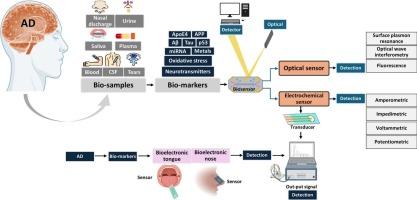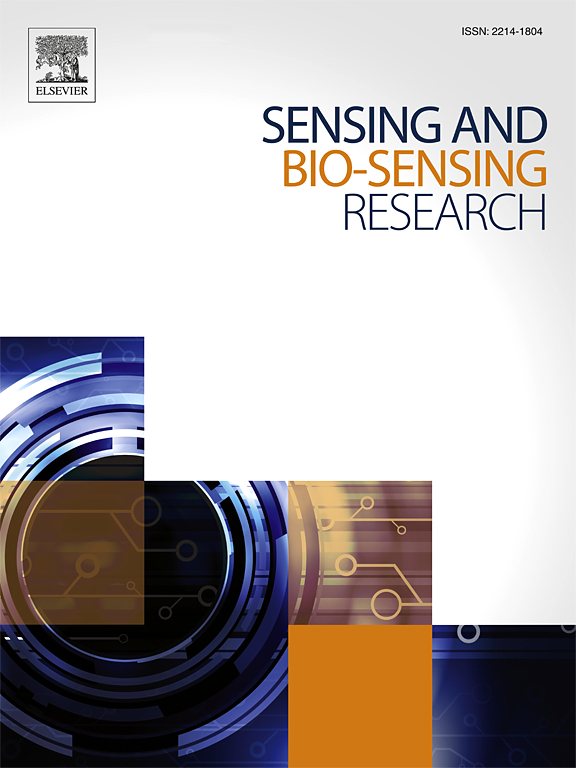生物传感器和生物标记物:检测阿尔茨海默病的动态二重奏
IF 5.4
Q1 CHEMISTRY, ANALYTICAL
引用次数: 0
摘要
阿尔茨海默病是最常见、最昂贵的慢性进行性神经退行性疾病,对全球公共健康的影响最大。然而,诊断这种神经退行性疾病具有挑战性,通常依赖于症状出现后应用的传统临床诊断技术,这些方法复杂、昂贵、耗时,而且可能具有侵入性。这阻碍了用于护理点应用的有效工具的开发。为了解决这些局限性,研究人员利用生物传感器开发了多种生物传感技术,这些技术具有极佳的选择性和灵敏度,能更有效、更及时地在早期阶段检测阿尔茨海默病生物标志物。本综合研究侧重于各种生物流体中有望用于阿尔茨海默病检测的生物标记物,以及相应的障碍和优势。此外,我们还全面综述了当前的生物传感技术,重点介绍了电化学和光学生物传感器,它们在检测阿尔茨海默病生物标记物方面以其卓越的灵敏度和选择性而著称。这些生物传感器有助于在护理点检测中对阿尔茨海默病进行早期诊断,从而提高了阿尔茨海默病的护理点应用。我们还探索将生物电子舌和生物电子鼻作为检测阿尔茨海默病生物标志物的创新型无创工具,从而进一步促进阿尔茨海默病的护理点应用。本文章由计算机程序翻译,如有差异,请以英文原文为准。

Biosensors and biomarkers: A dynamic duo towards Alzheimer's disease detection
Alzheimer's disease is the most common and costly chronic progressive neurodegenerative disorder, with the highest global public health impact. However, diagnosing this neurodegenerative disorder is challenging and often relies on traditional clinical diagnostics techniques applied after symptoms appear, which are complex, costly, time-consuming, and potentially intrusive methods. This hinders the development of effective tools for Point-of-Care applications. To address these limitations, researchers have been developing several biosensing techniques utilizing biosensors, which have excellent selectivity and sensitivity for detecting Alzheimer's disease biomarkers at an early stage more efficiently and promptly. This comprehensive study focuses on promising biomarkers for Alzheimer's disease detection in various bio-fluids, as well as the accompanying obstacles and advantages. Furthermore, we provide a comprehensive review of current biosensing techniques, focusing on electrochemical and optical biosensors, which are well-known for their exceptional sensitivity and selectivity in detecting Alzheimer's disease biomarkers. These biosensors facilitate the early diagnosis of Alzheimer's disease in point-of-care testing, thereby enhancing point-of-care applications for Alzheimer's disease. We also explore bioelectronic tongues and bioelectronic noses as innovative, non-invasive tools for detecting biomarkers in Alzheimer's disease, which further facilitates point-of-care applications for Alzheimer's disease.
求助全文
通过发布文献求助,成功后即可免费获取论文全文。
去求助
来源期刊

Sensing and Bio-Sensing Research
Engineering-Electrical and Electronic Engineering
CiteScore
10.70
自引率
3.80%
发文量
68
审稿时长
87 days
期刊介绍:
Sensing and Bio-Sensing Research is an open access journal dedicated to the research, design, development, and application of bio-sensing and sensing technologies. The editors will accept research papers, reviews, field trials, and validation studies that are of significant relevance. These submissions should describe new concepts, enhance understanding of the field, or offer insights into the practical application, manufacturing, and commercialization of bio-sensing and sensing technologies.
The journal covers a wide range of topics, including sensing principles and mechanisms, new materials development for transducers and recognition components, fabrication technology, and various types of sensors such as optical, electrochemical, mass-sensitive, gas, biosensors, and more. It also includes environmental, process control, and biomedical applications, signal processing, chemometrics, optoelectronic, mechanical, thermal, and magnetic sensors, as well as interface electronics. Additionally, it covers sensor systems and applications, µTAS (Micro Total Analysis Systems), development of solid-state devices for transducing physical signals, and analytical devices incorporating biological materials.
 求助内容:
求助内容: 应助结果提醒方式:
应助结果提醒方式:


